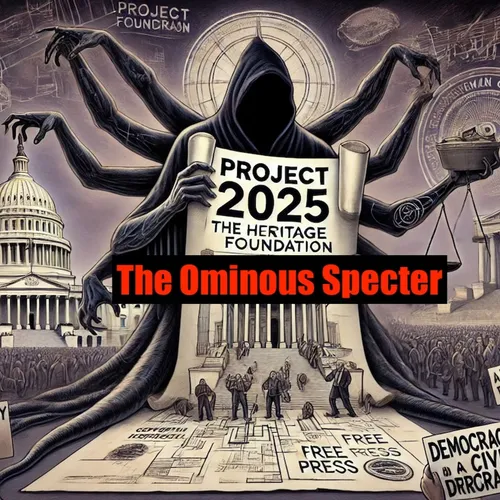Radical Restructuring Ahead: Project 2025's Conservative Overhaul of the Federal Government
- Author
- Quiet.Please
- Published
- Thu 06 Feb 2025
- Episode Link
- https://www.spreaker.com/episode/radical-restructuring-ahead-project-2025-s-conservative-overhaul-of-the-federal-government--64235551
As I delve into the intricacies of Project 2025, a federal policy agenda crafted by former Trump administration officials in collaboration with The Heritage Foundation, it becomes clear that this initiative is more than just a set of policy proposals – it's a blueprint for a radical restructuring of the American government.
Project 2025, encapsulated in the 900-page manual "Mandate For Leadership," is a comprehensive plan to reorganize the entire federal government, agency by agency, to align with a conservative agenda. The Heritage Foundation, a conservative think tank known for its opposition to abortion and reproductive rights, LGBTQ rights, immigrants’ rights, and racial equity, is at the helm of this project. Despite Donald Trump's attempts to distance himself, the connections run deep; at least 140 people involved in Project 2025 previously worked in Trump’s administration, and Heritage Foundation President Kevin Roberts, who was part of Trump’s transition team in 2016, has described the project as "institutionalizing Trumpism"[1][2][3].
One of the most striking aspects of Project 2025 is its sweeping overhaul of federal agencies. For instance, the project proposes merging the Bureau of Economic Analysis, the Census Bureau, and the Bureau of Labor Statistics into a single entity, aligning its mission with conservative principles. This includes maximizing the hiring of political appointees in statistical analysis positions, a move that could significantly politicize data collection and analysis[3].
In the realm of science policy, Project 2025 outlines a future where the Department of Energy focuses on fundamental research rather than energy technology development and climate change programs. The report suggests eliminating many DOE offices and programs, arguing they act as subsidies to the private sector. The Environmental Protection Agency (EPA) would also face significant changes, with proposals to prevent the agency from using certain climate change impact projections and to require clear congressional authorization for any science activity. Mandy Gunasekara, former chief of staff at the EPA during the Trump administration, authored the EPA chapter, reflecting the deep ties between Project 2025 and Trump's previous policies[2].
The project's vision for the executive branch is perhaps its most contentious aspect. It seeks to place the entire executive branch under direct presidential control, eliminating the independence of agencies like the Department of Justice (DOJ), the Federal Bureau of Investigation (FBI), and the Federal Communications Commission (FCC). This is based on an expansive interpretation of the unitary executive theory, which aims to centralize greater control in the White House. As Kevin Roberts put it, "all federal employees should answer to the president"[3].
Project 2025 also delves into personnel changes, proposing the reclassification of tens of thousands of federal civil service workers as political appointees. This would allow for the replacement of current employees with Trump loyalists, using a questionnaire to screen potential recruits for their adherence to the project's agenda. This approach is reminiscent of Trump's previous efforts to remove employees he deemed disloyal, regardless of their ideological convictions[3].
The impact on social and economic policies is equally profound. Project 2025 recommends work requirements for people reliant on the Supplemental Nutrition Assistance Program (SNAP), which issues food stamps, and suggests legislation to pay Americans more for working on Sundays, citing the biblical ordinance of the Sabbath. It also proposes cutting overtime protections for 4.3 million workers, limiting access to food assistance for over 40 million people, and denying students in 25 states and Washington, D.C. access to student loans if their schools provide in-state tuition to undocumented immigrants[5].
